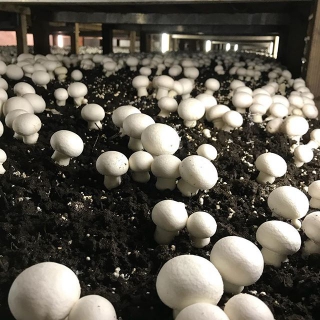
Shining the Light on Growing Mushrooms in the Dark
29 April 2019True or false: Light is needed for food to grow? The answer: false, especially if the food you are growing is a fungus.
By Lisa Parrish, GMC editor
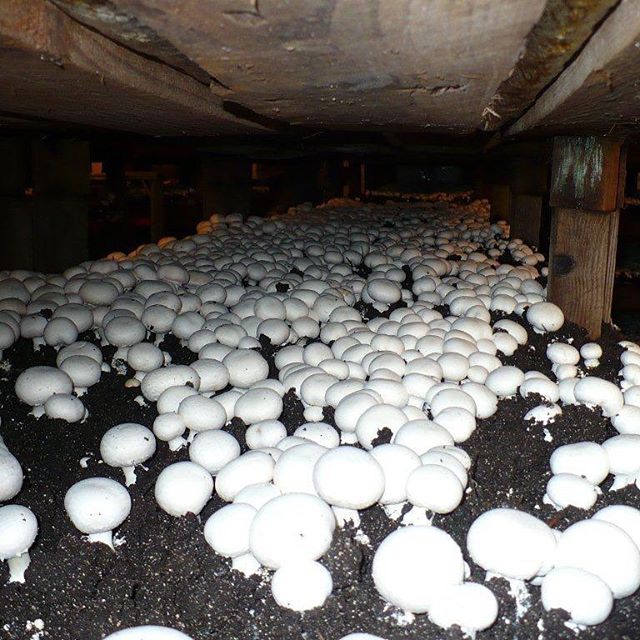 Mushrooms are one of the most sustainable crops produced in the U.S. Grown vertically in cement buildings, one pound of mushrooms requires only 1.8 pounds of water and generates the equivalent of .7 pounds of CO2. The fungus is grown in composted beds of agricultural materials that after harvest is turned into potting soil and given to farmers. And, as mentioned before, light is only required to harvest and not to grow the produce.
Mushrooms are one of the most sustainable crops produced in the U.S. Grown vertically in cement buildings, one pound of mushrooms requires only 1.8 pounds of water and generates the equivalent of .7 pounds of CO2. The fungus is grown in composted beds of agricultural materials that after harvest is turned into potting soil and given to farmers. And, as mentioned before, light is only required to harvest and not to grow the produce.
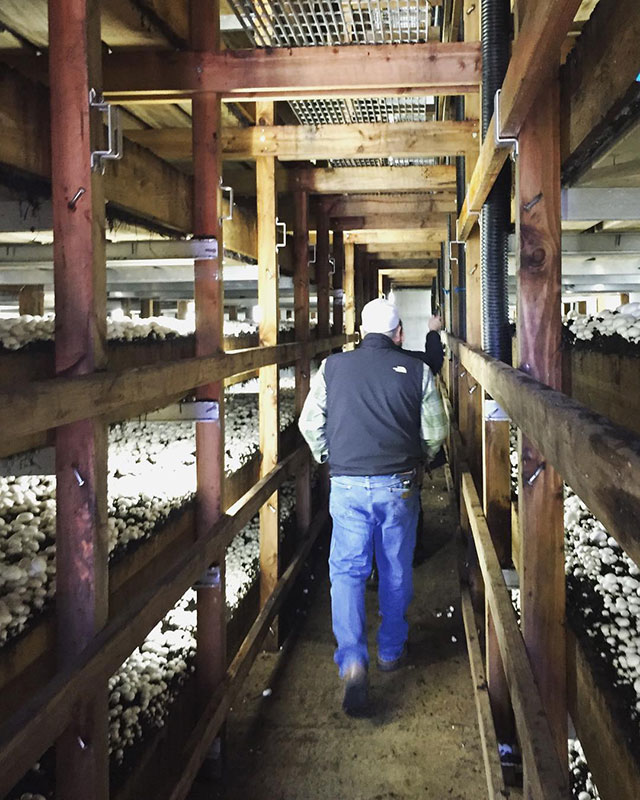 Not Your Ordinary Farming Practices
Not Your Ordinary Farming Practices
First Generation Farms owner Daniel Beltran and his daughter Sonya Beltran, director of operations, annually harvest 11 million pounds of white button mushrooms on their Avondale, Penn., farm. Daniel, a native of Mexico, has been farming mushrooms in Pennsylvania for over 38 years. “Mushrooms are so delicate. It’s different (farming mushrooms) and I love it. It’s my life,” he said.
The windowless concrete buildings that house the baby fungi are filled with five long rows of wooden beds. Each row features three or four layers of beds filled with composting materials. Mushrooms grow year-round in this controlled environment.
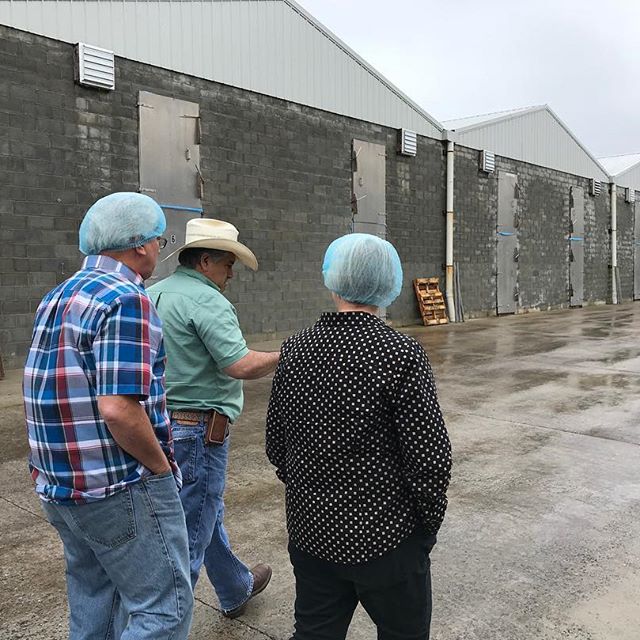 Daniel describes the beginning organic material as a mixture of straw, hay, corn, a small amount of cocoa bean shells, chicken and pork manure and some ash. After purchasing the compost and before planting the mushroom spawns, workers pasteurize the soil twice. “We use steam to sterilize the soil. We will bring the soil temperature up to 145 to 150 degrees to burn off any bacteria,” Daniel said. It takes nearly 14 days to pretreat the soil, readying it for mushroom spawns.
Daniel describes the beginning organic material as a mixture of straw, hay, corn, a small amount of cocoa bean shells, chicken and pork manure and some ash. After purchasing the compost and before planting the mushroom spawns, workers pasteurize the soil twice. “We use steam to sterilize the soil. We will bring the soil temperature up to 145 to 150 degrees to burn off any bacteria,” Daniel said. It takes nearly 14 days to pretreat the soil, readying it for mushroom spawns.
Mycelium, or mushroom spawn, is purchased and used to “seed” the beds. After the addition of spawn, peat moss, and light water spray, mushrooms begin to grow in four or five days with the harvesting beginning 15 to 17 days after planting. The houses are kept dark, warm and moist during the growing process.
Click here for a short, time-lapse video of mushroom growth in six days.
Harvested by hand, white button mushrooms need to be handled gently to avoid bruising and blemishes, according to Sonya. “There’s something about harvesting by hand,” she said. “It’s a lost art. I watch the harvesters and they are so fast and separate sizes so quickly. I think to myself, ‘How are they doing that?’ I am proud that we harvest by hand.”
Spawns are harvested three times – described at breaks - before the growing cycle ends. Daniel uses the analogy of a burning candle to understand the mushroom’s continuous growth pattern. “It’s like the wick on a candle, the flame keeps burning even as the candle burns down.”
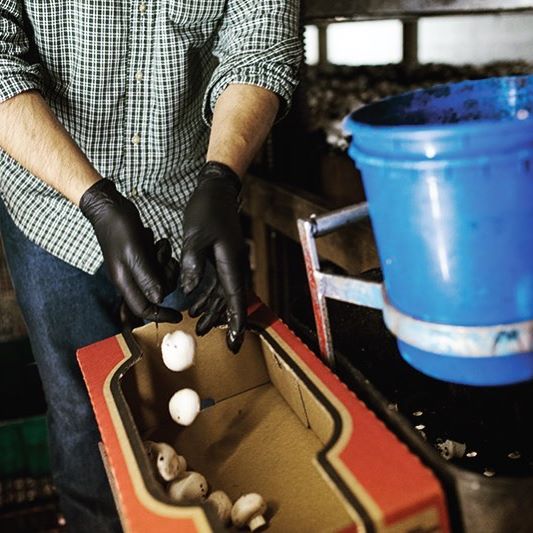 The Beltran’s harvest three breaks before sterilizing the soil. According to Daniel, after the last break the yield comes down and the costs go up. The cycle is completed when the remaining sterilized soil is distributed to farmers and the grow houses are steam cleaned at 150 degrees for 48 hours. “We empty the houses and run the steam to make sure there are no diseases, infections or cross contaminations in the empty house. It’s super clean and we are ready for the next cycle,” said Sonya.
The Beltran’s harvest three breaks before sterilizing the soil. According to Daniel, after the last break the yield comes down and the costs go up. The cycle is completed when the remaining sterilized soil is distributed to farmers and the grow houses are steam cleaned at 150 degrees for 48 hours. “We empty the houses and run the steam to make sure there are no diseases, infections or cross contaminations in the empty house. It’s super clean and we are ready for the next cycle,” said Sonya.
Each mushroom growing house produces 44,000 pounds of mushroom during the 10-week growing cycle. The Beltrans typically grow five cycles each year.
Healthy and Flavorful
Although not a fruit or vegetable, mushrooms have excellent nutritional value and are considered a superfood. They are low in carbohydrates and sodium and high in potassium and Vitamin B. At 90 percent water, they have no fat or cholesterol. They are also full of micronutrients that have anti-inflammatory and antioxidant properties.
Beyond their healthy qualities, mushrooms also are full of earthy flavor readily described as umami. The white mushrooms grown by First Generation Farms generally have a neutral flavor but when cooked the earthy aspects intensify.
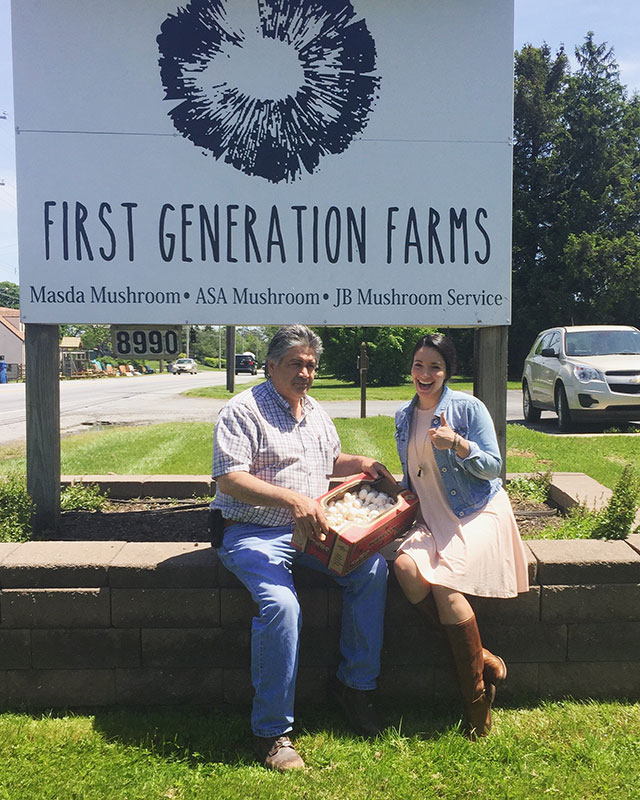 Sonya eats a plant-based diet due to allergy restrictions. And, she loves all mushroom varieties, especially in soup. “I will start with vegetable broth and add button and exotic mushrooms or whatever I have. I make it my own. I think it’s fun to try and figure out different flavors,” she explained. Daniel prefers mushrooms stuffed with crabmeat, which are a staple at their family get togethers. “Mushrooms allow you to get as complicated or as easy as you want,” Sonya said.
Sonya eats a plant-based diet due to allergy restrictions. And, she loves all mushroom varieties, especially in soup. “I will start with vegetable broth and add button and exotic mushrooms or whatever I have. I make it my own. I think it’s fun to try and figure out different flavors,” she explained. Daniel prefers mushrooms stuffed with crabmeat, which are a staple at their family get togethers. “Mushrooms allow you to get as complicated or as easy as you want,” Sonya said.
After 38 years in the mushroom growing business, one might think Daniel has witnessed a great deal of industry changes. However, this isn’t the case with mushroom production. “Mushroom growing is a 100-year-old industry,” said Daniel. “It all started with one mother culture. The labs all take spawns and create different names (with various features) but the base is the same mother culture. I feel fortunate to be in this country and in this industry. It’s been very good.”
